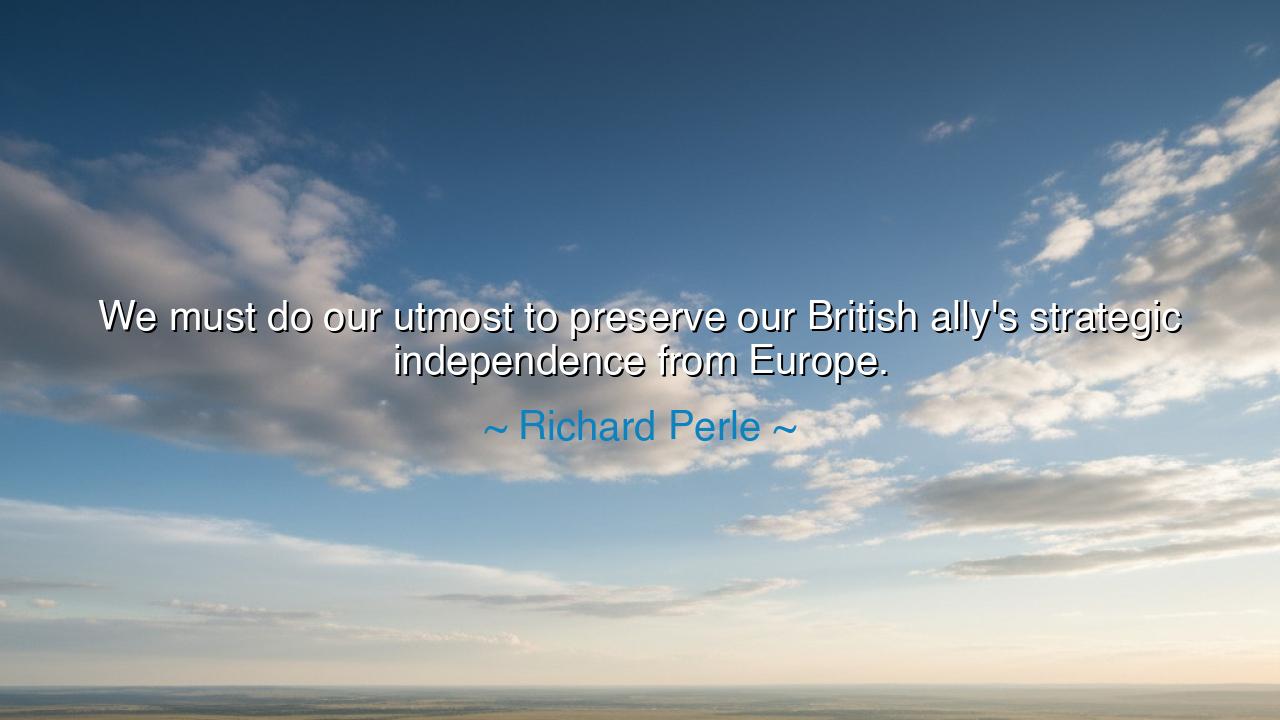
We must do our utmost to preserve our British ally's strategic
We must do our utmost to preserve our British ally's strategic independence from Europe.






Hear now the words of Richard Perle, strategist and statesman of a turbulent age: “We must do our utmost to preserve our British ally’s strategic independence from Europe.” In these words lies not merely a political calculation, but a deep meditation on the balance of power, the nature of sovereignty, and the sacred duty of allies. He speaks of independence, not only as the freedom of a nation to act upon its own will, but as the foundation upon which its honor, its strength, and its destiny are built. For Perle understood what the ancients always knew: that alliances may be necessary, but the soul of a nation must never be absorbed into the will of another.
The origin of this statement rests in the closing years of the twentieth century, when the tides of history once more sought to shape the fate of Europe. As the European Union deepened its integration — binding nations together in trade, law, and defense — many feared that Britain, the island that had stood unconquered through centuries of storm, might lose its strategic independence. Perle, an American of keen vision, saw Britain not merely as an ally, but as a pillar of Western liberty — a bridge between the Old World and the New. His plea was thus not only for policy, but for principle: that the United Kingdom, bound by friendship to the United States, should remain free in spirit, unswayed by the gravitational pull of continental ambition.
In these words, Perle evoked an alliance older and deeper than treaties — the Anglo-American bond, forged in war, tempered in peace, and rooted in shared ideals of democracy, individual liberty, and the rule of law. The British had stood beside America through the darkest hours of the twentieth century, when tyranny sought to shroud the earth. From the beaches of Normandy to the skies over Berlin, from Churchill’s rallying cry to Roosevelt’s steadfast hand, this partnership had defended not one nation, but a civilization. To Perle, the thought of Britain subsumed under a European collective was not merely a political concern — it was a diminishment of the very independence that had made such courage possible.
Consider, then, the story of Winston Churchill, who, in the aftermath of the Second World War, spoke of building a “United States of Europe” — yet never intended for Britain to lose its distinct place among nations. Churchill saw Britain’s destiny as global, maritime, and free — a nation that looked outward to the world, not inward to the continent. He believed that Britain’s strength lay in her independence of thought and action, and in her power to bridge nations without being bound by them. It is this same vision that Perle sought to defend — a vision in which sovereignty is the wellspring of unity, not its victim.
The ancients, too, spoke of this balance. The Greek city-states, while united by language and culture, fiercely guarded their autonomy, knowing that freedom thrives not in uniformity, but in diversity of strength. Sparta could be Sparta only because Athens was Athens. In the same way, Perle understood that the strength of the West depended not on the merging of nations into one indistinct whole, but on the cooperation of free peoples who could stand side by side — equal, sovereign, and resolute. For when independence is lost, even the mightiest allies become hollow shadows of their former selves.
Yet, there is a deeper meaning still within Perle’s warning. He reminds us that dependence, whether of nations or individuals, is a slow and subtle surrender. It begins not with conquest, but with comfort; not with force, but with convenience. When a people give up their right to choose in exchange for ease or safety, they trade the inheritance of their ancestors for the illusions of peace. Perle’s words, therefore, are not only for nations but for all who cherish freedom — a call to vigilance against the quiet erosion of self-determination.
So let the lesson of his words be this: whether in the councils of nations or in the chambers of the heart, independence must be guarded as the soul’s most precious possession. It is not isolation, but the foundation of true fellowship — for only the free can offer friendship that is sincere. As Britain once stood with America in the face of tyranny, so too must every generation stand firm in the defense of its own freedom. Do not yield your judgment to the crowd, nor your will to comfort, nor your principles to compromise. For the destiny of every people — and every person — rests upon the same eternal truth: that independence is the mother of honor, and from it all other virtues flow.
Thus, remember Richard Perle’s plea not as a relic of politics, but as a timeless teaching. Empires may rise and unions may form, but the spirit of a free nation — and of a free soul — must never bow. Preserve your strategic independence, not only in the realm of statecraft, but in the governance of your own life. For only the independent can act with courage, speak with truth, and stand, when others kneel, for the sacred gift of freedom.






AAdministratorAdministrator
Welcome, honored guests. Please leave a comment, we will respond soon